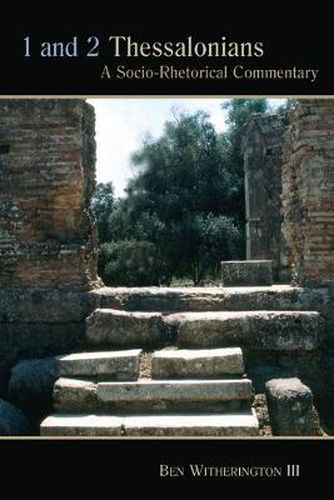Readings Newsletter
Become a Readings Member to make your shopping experience even easier.
Sign in or sign up for free!
You’re not far away from qualifying for FREE standard shipping within Australia
You’ve qualified for FREE standard shipping within Australia
The cart is loading…






Paul’s two letters to the Thessalonians stand as some of the very earliest Christian documents, yet they appear well into Paul’s missionary career, giving them a unique context well worth exploring. In this first full-scale socio-rhetorical commentary on 1 and 2 Thessalonians, Ben Witherington gleans fresh insight from reading Paul’s text in the light of rhetorical concerns and patterns, early Jewish theology, and the first-century historical situation in Macedonia. Witherington’s distinctive socio-rhetorical approach helps unearth insights that would otherwise remain hidden using only form criticism, epistolary categories, and traditional criticism. Witherington details Thessalonica’s place as the metropolis of Macedonia, and he carefully unpacks the social situation of Paul and his recipients. Scholars will appreciate the careful analysis and rhetorical insights contained here, while Witherington’s clear prose and sensitivity to Paul’s ideas make this work ideal for all who desire a useful, readable commentary on 1 and 2 Thessalonians.
$9.00 standard shipping within Australia
FREE standard shipping within Australia for orders over $100.00
Express & International shipping calculated at checkout
Stock availability can be subject to change without notice. We recommend calling the shop or contacting our online team to check availability of low stock items. Please see our Shopping Online page for more details.
Paul’s two letters to the Thessalonians stand as some of the very earliest Christian documents, yet they appear well into Paul’s missionary career, giving them a unique context well worth exploring. In this first full-scale socio-rhetorical commentary on 1 and 2 Thessalonians, Ben Witherington gleans fresh insight from reading Paul’s text in the light of rhetorical concerns and patterns, early Jewish theology, and the first-century historical situation in Macedonia. Witherington’s distinctive socio-rhetorical approach helps unearth insights that would otherwise remain hidden using only form criticism, epistolary categories, and traditional criticism. Witherington details Thessalonica’s place as the metropolis of Macedonia, and he carefully unpacks the social situation of Paul and his recipients. Scholars will appreciate the careful analysis and rhetorical insights contained here, while Witherington’s clear prose and sensitivity to Paul’s ideas make this work ideal for all who desire a useful, readable commentary on 1 and 2 Thessalonians.